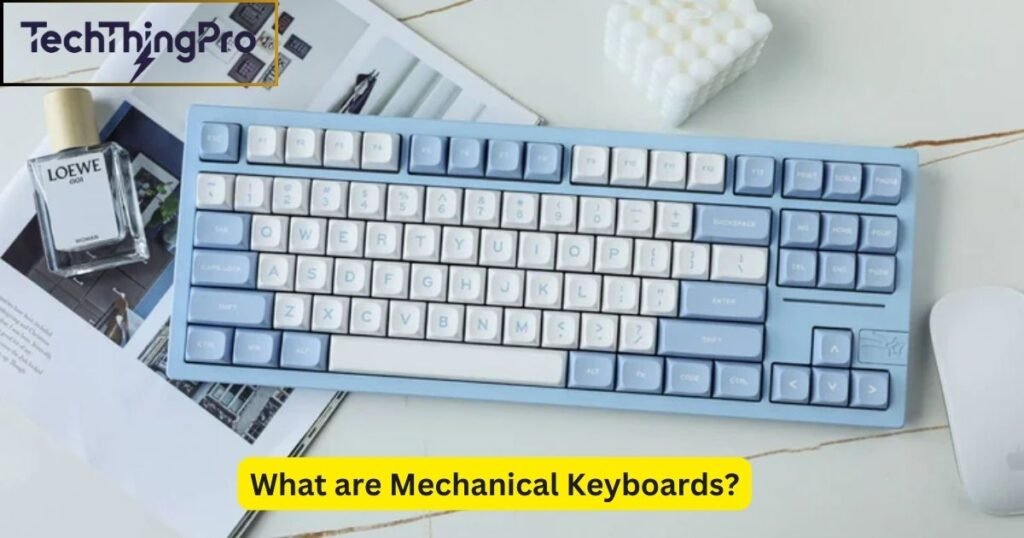Mechanical vs. Membrane Keyboards refers to two popular types of keyboards used for typing or gaming. Mechanical keyboards use individual switches under each key, while membrane keyboards rely on a rubber membrane to register keystrokes. Each offers unique features that cater to different needs.
When choosing between mechanical vs. membrane keyboards, it’s important to consider what works best for you. Mechanical keyboards are known for their durability and precision, while membrane keyboards are quieter and more affordable. Finding the right fit depends on your typing style and needs.
What are Mechanical Keyboards?

A mechanical keyboard is built with individual mechanical switches for every key. Each switch has three main parts: a base, a spring, and a stem. These switches provide a unique typing experience, often categorized into linear switches, tactile switches, and clicky switches.
Linear vs. tactile switches differ mainly in how they feel; linear switches offer smooth keystrokes, while tactile ones provide a noticeable bump at the actuation point. Clicky switches add an audible “click” sound for those who enjoy auditory feedback while typing.
Read 📖 More: What is a Hall Effect Keyboard? : A Comprehensive Guide
The keyboard durability of mechanical types is impressive. Most models are rated for 50 to 80 million keystrokes, far outlasting membrane options. This makes them a popular choice for gaming keyboards, programming keyboards, and anyone seeking a reliable typing experience.
Additionally, many mechanical keyboards offer features like hot-swappable keyboards, allowing you to change switches without soldering, and keycap customization, so you can personalize the look and feel of your device.
What are Membrane Keyboards?
A membrane keyboard operates using a set of flexible pressure pads layered with conductive material. When you press a key, the top layer pushes down onto the lower layer, completing the circuit to register the keystroke.
This structure creates a softer, quieter typing experience, making membrane keyboards ideal as quiet keyboards for office use or environments requiring minimal noise.
One standout feature of membrane keyboards is their affordability. They are budget-friendly keyboards, perfect for light office tasks or casual use.
While they lack the customization options of mechanical keyboards, their spill-resistant keyboards designs make them more durable against liquid damage.
| Feature | Mechanical Keyboards | Membrane Keyboards |
| Typing Feel | Precise and customizable | Soft and quiet |
| Durability | 50–80 million keystrokes | 5 million keystrokes |
| Noise Levels | Can be loud (varies by switch) | Quiet operation |
| Customization | Extensive (keycaps, switches) | Limited |
| Price Range | Expensive | Affordable |
Key Differences Between Mechanical and Membrane Keyboards
1. Structure: mechanical switch VS membrane layer
Mechanical keyboards rely on independent mechanical switches, providing consistency and precision for each keystroke. This structure ensures every keypress feels distinct, reducing errors and offering superior feedback.
Membrane keyboards, on the other hand, use a single-layer membrane system. While simpler, this design compromises the typing feel and longevity compared to mechanical models.
2. Key feel: Direct VS soft
Mechanical keyboards excel in providing tactile feedback through their switches, making each keystroke noticeable and satisfying. This helps improve typing speed and accuracy.
Membrane keyboards feel softer and quieter, which is more comfortable for prolonged use in quiet settings, but they lack the crisp feedback of mechanical alternatives.
3. Durability: 50 million VS 5 million
The switch lifespan comparison shows a significant gap between the two types. Mechanical keyboards can handle up to 80 million keypresses, making them durable keyboards for long-term use. Membrane keyboards, with only 5 million keypresses, wear out faster and are harder to repair, often requiring complete replacement.
4. Customization: Support VS Not support
Mechanical keyboards are designed with keyboard customization in mind. You can replace keycaps, switches, and even program macros for specific tasks. Backlit keyboards and RGB lighting are common among mechanical models, adding aesthetic appeal and functionality. Membrane keyboards, however, lack these features due to their simpler construction.
5. Cost: High cost VS low cost
Mechanical keyboards are more expensive due to their advanced technology and macro programming keys. In contrast, membrane keyboards are affordable keyboards, catering to those on a tight budget or looking for a basic option.
6. Noise Level: Loud VS Quiet
Noise levels in keyboards vary widely. Mechanical keyboards, especially those with clicky switches, are louder, making them less ideal for shared spaces. Membrane keyboards are much quieter, suitable for quiet keyboards for office use.
7. N-Key Rollover: Multiple keys VS Single key
Mechanical keyboards often support full N-key rollover, which allows multiple keys to be pressed simultaneously without conflict, making them excellent gaming keyboards. Membrane keyboards usually limit this capability to 2–6 keys, which may hinder gaming or multitasking.
8. Response Time: Fast VS Slow
Mechanical keyboards are faster, with a response time in keyboards of 1 ms. Membrane keyboards lag slightly, taking 5–10 ms, which may not suit professional gamers or typists needing speed and precision.
Pros and Cons
| Mechanical Keyboards | Membrane Keyboards |
| Pros: | Pros: |
| Tactile and audible feedback | Quieter operation |
| Long-lasting and durable | Lightweight and portable |
| Highly customizable | More affordable |
| Full N-key rollover for gaming | Spill-resistant designs available |
| Cons: | Cons: |
| More expensive | Limited lifespan |
| Noisy operation (depending on switch type) | Minimal customization |
| Heavier and less portable |
Which Keyboard is Better for You?
For gaming
For gamers, mechanical keyboards are the clear winner. With their fast response time, N-key rollover, and customizable switches, they enhance precision and performance. Whether you prefer linear vs. tactile switches or even clicky switches, there’s an option tailored for every gamer.
For programming
Programmers will appreciate the tactile feedback and reliability of mechanical keyboards. Their precise keystrokes and durable build make coding smoother and faster. Membrane keyboards can suffice for budget-conscious coders but may fall short in long-term use.
For daily office use
Office workers may prefer quiet keyboards for office use. Membrane keyboards are lighter, portable keyboards, and often include spill-resistant keyboards, making them practical for daily tasks. However, mechanical keyboards can also shine if durability and comfort are prioritized.
Final Thoughts
Choosing between mechanical keyboards and membrane keyboards ultimately depends on your specific needs. If you value precision, durability, and customization, mechanical keyboards are a fantastic investment, especially for gamers and programmers.
On the other hand, membrane keyboards offer a softer, quieter typing experience at a more affordable price, making them ideal for office workers or casual users.
Both options have their strengths and weaknesses, but the right choice comes down to how you plan to use your keyboard. Consider your priorities, whether it’s typing speed improvement, portability, or budget, and you’ll find the perfect fit.

Lily Watkins is an experienced tech writer specializing in the latest trends and innovations. She is passionate about making complex technology accessible and shares her insights on TechThingPro.com.

